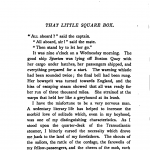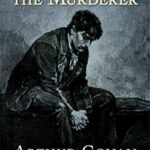I have remarked that I am a physical coward. I am a moral one also. It is seldom that the two defects are united to such a degree in the one character. I have known many men who were most sensitive to bodily danger, and yet were distinguished for the independence and strength of their minds. In my own case, however, I regret to say that my quiet and retiring habits had fostered a nervous dread of doing anything remarkable or making myself conspicuous, which exceeded, if possible, my fear of personal peril. An ordinary mortal placed under the circumstances in which I now found myself would have gone at once to the Captain, confessed his fears, and put the matter into his hands. To me, however, constituted as I am, the idea was most repugnant. The thought of becoming the observed of all observers, cross-questioned by a stranger, and confronted with two desperate conspirators in the character of a denouncer, was hateful to me. Might it not by some remote possibility prove that I was mistaken? What would be my feelings if there should turn out to be no grounds for my accusation? No, I would procrastinate; I would keep my eye on the two desperadoes and dog them at every turn. Anything was better than the possibility of being wrong.
Then it struck me that even at that moment some new phase of the conspiracy might be developing itself. The nervous excitement seemed to have driven away my incipient attack of sickness, for I was able to stand up and lower myself from the boat without experiencing any return of it. I staggered along the deck with the intention of descending into the cabin and finding how my acquaintances of the morning were occupying themselves. Just as I had my hand on the companion-rail, I was astonished by receiving a hearty slap on the back, which nearly shot me down the steps with more haste than dignity.
“Is that you, Hammond?” said a voice which I seemed to recognise.
“God bless me,” I said, as I turned round, “it can’t be Dick Merton! Why, how are you, old man?”
This was an unexpected piece of luck in the midst of my perplexities. Dick was just the man I wanted; kindly and shrewd in his nature, and prompt in his actions, I should have no difficulty in telling him my suspicions, and could rely upon his sound sense to point out the best course to pursue. Since I was a little lad in the second form at Harrow, Dick had been my adviser and protector. He saw at a glance that something had gone wrong with me.
“Hullo!” he said, in his kindly way, “what’s put you about, Hammond? You look as white as a sheet. Mal de mer, eh?”
“No, not that altogether,” said I. “Walk up and down with me, Dick; I want to speak to you. Give me your arm.”
Supporting myself on Dick’s stalwart frame, I tottered along by his side; but it was some time before I could muster resolution to speak.
“Have a cigar?” said he, breaking the silence.
“No, thanks,” said I. “Dick, we shall be all corpses to-night.”
“That’s no reason against your having a cigar now,” said Dick, in his cool way, but looking hard at me from under his shaggy eyebrows as he spoke. He evidently thought that my intellect was a little gone.
“No,” I continued, “it’s no laughing matter; and I speak in sober earnest, I assure you. I have discovered an infamous conspiracy, Dick, to destroy this ship and every soul that is in her;” and I then proceeded systematically, and in order, to lay before him the chain of evidence which I had collected. “There, Dick,” I said, as I concluded, “what do you think of that and, above all, what am I to do?”
To my astonishment he burst into a hearty fit of laughter.
“I’d be frightened,” he said, “if any fellow but you had told me as much. You always had a way, Hammond, of discovering mares’ nests. I like to see the old traits breaking out again. Do you remember at school how you swore there was a ghost in the long room, and how it turned out to be your own reflection in the mirror? Why, man,” he continued, “what object would any one have in destroying this ship? We have no great political guns aboard. On the contrary, the majority of the passengers are Americans. Besides, in this sober nineteenth century, the most wholesale murderers stop at including themselves among their victims. Depend upon it, you have misunderstood them, and have mistaken a photographic camera, or something equally innocent, for an infernal machine.”
“Nothing of the sort, sir,” said I, rather touchily. “You will learn to your cost, I fear, that I have neither exaggerated nor misinterpreted a word. As to the box, I have certainly never before seen one like it. It contained delicate machinery; of that I am convinced, from the way in which the men handled it and spoke of it.”
“You’d make out every packet of perishable goods to be a torpedo,” said Dick, “if that is to be your only test.”
“The man’s name was Flannigan,” I continued.
“I don’t think that would go very far in a court of law,” said Dick; “but come, I have finished my cigar. Suppose we go down together and split a bottle of claret. You can point out these two Orsinis to me if they are still in the cabin.”
“All right,” I answered; “I am determined not to lose sight of them all day. Don’t look hard at them, though, for I don’t want them to think that they are being watched.”
“Trust me,” said Dick; “I’ll look as unconscious and guileless as a lamb;” and with that we passed down the companion and into the saloon.
A good many passengers were scattered about the great central table, some wrestling with refractory carpet-bags and rug-straps, some having their luncheon, and a few reading and otherwise amusing themselves. The objects of our quest were not there. We passed down the room and peered into every berth, but there was no sign of them. “Heavens!” thought I, “perhaps at this very moment they are beneath our feet, in the hold or engine-room, preparing their diabolical contrivance!” It was better to know the worst than to remain in such suspense.
“Steward,” said Dick, “are there any other gentlemen about?”
“There’s two in the smoking room, sir,” answered the steward.
The smoking-room was a little snuggery, luxuriously fitted up, and adjoining the pantry. We pushed the door opened and entered. A sigh of relief escaped from my bosom. The very first object on which my eye rested was the cadaverous face of Flannigan, with its hard-set mouth and unwinking eye. His companion sat opposite to him. They were both drinking, and a pile of cards lay upon the table. They were engaged in playing as we entered. I nudged Dick to show him that we had found our quarry, and we sat down beside them with as unconcerned an air as possible. The two conspirators seemed to take little notice of our presence. I watched them both narrowly. The game at which they were playing was “Napoleon.” Both were adepts at it, and I could not help admiring the consummate nerve of men who, with such a secret at their hearts, could devote their minds to the manipulation of a long suit or the finessing of a queen. Money changed hands rapidly; but the run of luck seemed to be all against the taller of the two players. At last he threw down his cards on the table with an oath, and refused to go on.
“No, I’m hanged if I do,” he said; “I haven’t had more than two of a suit for five hands.”
“Never mind,” said his comrade, as he gathered up his winnings; “a few dollars one way or the other won’t go very far after to-night’s work.”
I was astonished at the rascal’s audacity, but took care to keep my eyes fixed abstractedly upon the ceiling, and drank my wine in as unconscious a manner as possible. I felt that Flannigan was looking towards me with his wolfish eyes to see if I had noticed the allusion. He whispered something to his companion which I failed to catch. It was a caution, I suppose, for the other answered rather angrily—
“Nonsense! Why shouldn’t I say what I like? Over-caution is just what would ruin us.”
“I believe you want it not to come off,” said Flannigan.
“You believe nothing of the sort,” said the other, speaking rapidly and loudly. “You know as well as I do that when I play for a stake I like to win it. But I won’t have my words criticised and cut short by you or any other man. I have as much interest in our success as you have—more, I hope.”
He was quite hot about it, and puffed furiously at his cigar for some minutes. The eyes of the other ruffian wandered alternately from Dick Merton to myself. I knew that I was in the presence of a desperate man, that a quiver of my lip might be the signal for him to plunge a weapon into my heart, but I betrayed more self-command than I should have given myself credit for under such trying circumstances. As to Dick, he was as immovable and apparently as unconscious as the Egyptian Sphinx.
There was silence for some time in the smoking-room, broken only by the crisp rattle of the cards, as the man Muller shuffled them up before replacing them in his pocket. He still seemed to be somewhat flushed and irritable. Throwing the end of his cigar into the spittoon, he glanced defiantly at his companion and turned towards me.
“Can you tell me, sir,” he said, “when this ship will be heard of again?”
They were both looking at me; but though my face may have turned a trifle paler, my voice was as steady as ever as I answered—
“I presume, sir, that it will be heard of first when it enters Queenstown Harbour.”
“Ha, ha!” laughed the angry little man, “I knew you would say that. Don’t you kick me under the table, Flannigan, I won’t stand it. I know what I am doing. You are wrong, sir,” he continued, turning to me, “utterly wrong.”
“Some passing ship, perhaps,” suggested Dick.
“No, nor that either.”
“The weather is fine,” I said; “why should we not be heard of at our destination?”
“I didn’t say we shouldn’t be heard of at our destination. Possibly we may not, and in any case that is not where we shall be heard of first.”
“Where, then?” asked Dick.
“That you shall never know. Suffice it that a rapid and mysterious agency will signal our whereabouts, and that before the day is out. Ha, ha!” and he chuckled once again.
“Come on deck!” growled his comrade; “you have drunk too much of that confounded brandy-and-water. It has loosened your tongue. Come away!” and taking him by the arm he half led him, half forced him out of the smoking-room, and we heard them stumbling up the companion together, and on to the deck.
“Well, what do you think now?” I gasped, as I turned towards Dick. He was as imperturbable as ever.



